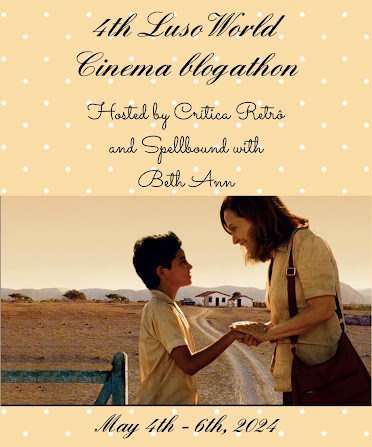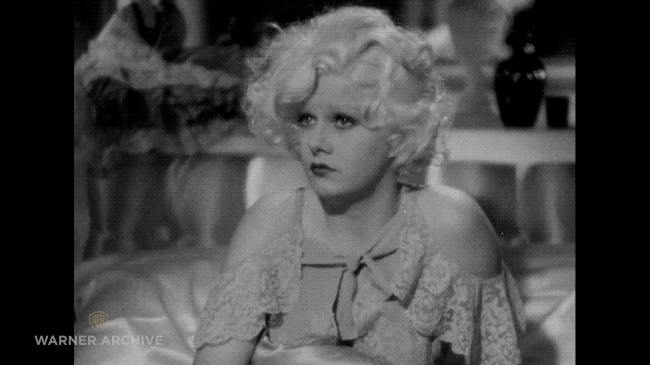If you’ve ever watched someone jump into a self-destructive cycle after receiving bad news, you know how hard it can be for them to climb out later.
This is the type of character Bette Davis explores in the 1939 melodrama Dark Victory, a film about a rich, gregarious woman who discovers she has a terminal illness – in this case, a brain tumour.
Davis’ compelling character progresses through the emotional stages of her illness. At first, she denies anything is wrong. But when she is confronted with medical evidence, she is determined to overcome her illness. “I’m young and strong and nothing can touch me,” she says desperately.
However, when Davis learns her condition is terminal, she explodes with anger. She fiercely turns on those closest to her, because she feels they have betrayed her. She also engages in self-destructive behaviour (involving men and alcohol), because why not? She’s going to die anyway.
Dark Victory has often been criticized – and rightly so – for its unrealistic portrayal of a terminal disease; Davis’s character doesn’t lose weight, or become haggard, or seem to have symptoms of an actual disease.
In fact, the only lasting physical evidence we see of Davis’ character undergoing brain surgery is the ever-present hat she wears for the next several scenes. As one character says, “You can’t tell a thing.”
In our opinion, Dark Victory isn’t meant to be the kind of film that examines how an illness affects the body. Rather, it’s the study of how an illness affects the psyche, and how one might come to terms with their mortality.

Davis in her gown and glam post-surgery cap. Image: Fanpop
Dark Victory‘s script may phrase things euphemistically, but it’s dealing with some pretty raw stuff. It shows us how the main character moves through shock and anger to eventual acceptance.
We first observe Davis’ sliding into self-destruction when she learns, by accident, that her case is terminal. This is just before she is to meet her surgeon/fiancé (George Brent) and best friend (Geraldine Fitzgerald) for lunch. Not only has she discovered the truth about her illness, she realizes they Knew, and didn’t tell her.
She’s already drinking heavily. When Brent and Fitzgerald arrive, she’s angry and sarcastic. “Am I well?” she asks them. “Shhh! It’s a secret. Or don’t you two know about secrets?”
As her anger ebbs, her character becomes detached, almost as though she’s numb. When her stableman (Humphrey Bogart) discovers one of her horses has bronchitis, Davis says, unfeelingly, “Why not just put her out of her misery.”
In this stage, she pushes away friends and gives no thought to personal safety. When Brent implores her to make peace with her condition and to meet her end “beautifully and finely”, she mocks his words. “I’ll die as I please,” she snaps. “Now leave me alone.”
Eventually, Davis starts to accept her fate, and wonders if she shouldn’t hurry things along. “It’s the waiting, day and night,” she says. “Would I be wrong if I made it [death] happen?”

Davis asks for George Brent’s forgiveness. Image: YouTube
Davis was nominated for a Best Actress Oscar with Dark Victory, which was her fourth Best Actress nomination. In our opinion, the nomination was well deserved.
Throughout her turmoil, Davis makes sure we understand her character’s pain and the very difficult task of accepting she will die. She behaves rudely and meanly, but never so much that we lose sympathy.
In fact, we start to wonder if we would behave any differently, and if we would ever arrive at the same kind of compliance.
If you’ve never seen Dark Victory, we recommend it – but save it for a day when you’re feeling upbeat.
Notes:
•Read Christina Wehner’s excellent review of Dark Victory HERE.
•For a list of Bette Davis’ Oscar wins and nominations, click HERE.
Dark Victory: starring Bette Davis, George Brent, Humphrey Bogart. Directed by Edmund Goulding. Written by Casey Robinson. Warner Bros. Pictures Inc., 1939, B&W, 105 mins.
This post is part of the Bette Davis Blogathon hosted by In the Good Old Days of Classic Hollywood. Click HERE to see all the fab entries.














Nice review. I’ve never seen this one! My wife loves Davis. I may look out for this one. Thanks!
LikeLiked by 1 person
If your wife likes Bette Davis, then she must – MUST – see this one. (Warning – it is a bit of a tear-jerker…)
LikeLiked by 1 person
Ah ok, haha. I will let her know. Thanks and great post! 🙂
LikeLiked by 1 person
Wonderful write-up! I remember so clearly the first time I saw this movie, sobbing in my sister’s apartment while she was at class. Davis was amazing as usual, and Bogie was…interesting. I gotta say, though, I kinda hate Geraldine Fitzgerald’s character. Ann is just so whiny and snivelly. I think she’s supposed to compensate for Judith’s lack of crying over her disease, but to me, it’s too much. Other than that, it’s a great film.
LikeLiked by 1 person
Yes, Fitzgerald’s character is a bit much, isn’t she? Plus, don’t you get the feeling that she’ll be gunning for George Brent after, you know, a suitable amount of time has passed…?
LikeLike
Weeped buckets first time I saw that ending. Too much. Liked Geraldine Fitzgerald. Wish she had been bigger star.
LikeLiked by 1 person
Yes, I cried too the first time I saw it. Was desperately hoping there would be a different outcome…
LikeLike
You raise some interesting points here about the film being about the psyche, not rhe physical deterioration. Terminal illness films are difficult to watch, but Davis is phenomenal in this role.
I once saw a remake with Elizabeth Montgomery which is also well done. Which feels like Bette Davis blasphemy yet true all the same.
But what I really want to know is do we have to wait until we are sick before we can wear such a lovely hat?
Great choice, great film, and an excellent read!
LikeLiked by 1 person
Haha! “Bette Davis blasphemy” – brilliant! The remake with Elizabeth M. definitely sounds worth it.
As for the hat, it’s cute, isn’t it? Davis’ character may have her mood swings in this film, but she always has a sense of style.
LikeLike
I haven’t seen this film in decades, but now I want to see it again. Thanks!
LikeLiked by 1 person
It had been a long time since I had seen it, too, until a couple of weeks ago. Bette Davis certainly gives you your money’s worth! 🙂
LikeLike
I love your perspective on how Dark Victory is about how people mentally and emotionally deal with terminal illness! That makes a lot of sense, that the film is not about cancer so much as dealing with morality. In that respect, the absence of any physical affects of cancer serves to sharpen the focus on how she is dealing with it because she still seems healthy and like she has so much to live for.
It’s wonderful to have one’s perspective on a film changed and broadened. Thanks! 🙂
LikeLiked by 1 person
It had been a long time since I’d seen this film, then when I saw it a couple of weeks ago, it struck me that Bette Davis’ character basically goes through the classic stages of grief.
Thanks for dropping by and for your comments. I always like to hear what you think. 🙂
LikeLiked by 1 person
I haven’t seen Dark Victory – yet I’ve heard about it many years ago.
I imagine there is no physical deterioration because of the Star System – I know Bette had no problems turning un-glamorous for a role, but I think it must have been the studio’s decision. This being said, any actress starring in a remak today (I hope nobody reads this and gets ideas) would have a physical and mental challenge, and would probably win an Oscar for such a performance.
Don’t forget to read my contribution to the blogathon! 🙂
Kisses!
Le
LikeLike
I agree – if there were to a remake today, the lead actress would have quite a job ahead of her, mentally and physically. It certainly would be an Oscar-worthy role!
LikeLike
Humphrey Bogart’s Irish accent was enough to make me want to end it all, but I do love this movie. I ALWAYS cry at the end. Plus I’ve been searching for that plaid jacket for 30 years. Thank you for this lovely reminder!
LikeLiked by 1 person
Yes, Bogart’s dodgy accent is a bit puzzling, isn’t it? Why did they feel it necessary? Why is a spotty accent better than no accent at all?
Oh yes, that plaid jacket is lovely! If you do find it, let me know – maybe there’ll be another one in my size! (haha)
LikeLike
Since George Brent really was Irish, it must have been particularly painful for him to hear Bogie’s efforts at the accent!
LikeLiked by 1 person
Yes, I think you’re right!
LikeLiked by 1 person
It’s a while since I’ve seen this, but I do remember what a powerful performance it is by Bette Davis. Great review – I’m interested to see how you track her going through the stages of grief, and will look out for this when I see it again.
LikeLiked by 1 person
I can’t imagine anyone but Bette Davis in this role. But yes, let me know what you think if you get the chance to see it again. 🙂
LikeLike
I really need to see this film- its definitely an essential-> both for Bette and Classic Film!!!
LikeLiked by 1 person
Oh yes, you must see this! Then review it! Dark Victory definitely deserves The Flapper Dame Treatment.
LikeLike
Great review! This was one of the first Bette Davis films that I saw and it had a lasting impact on me. I actually have only seen it twice through because it makes me super emotional! Now that you say it, I can definitely see how the film is more a portrayal of the psyche and I think that’s what makes it so difficult to watch in some ways. None of us know what happens when we die and I think it’s a fear that we all share which is what makes this film so emotional in a way. She was truly fantastic in this film though and it’s one of her films that made me realize just how great of an actress she was.
LikeLiked by 1 person
Yes, I know what you mean about Dark Victory making a person emotional. Those scenes at the end really get you, don’t they? They’re more proof of Bette’s fabulousness.
LikeLiked by 1 person
Davis might not look the part, but she sure knew how to act it! The issues that you highlight have always prevented me from fully embracing this film, but had Davis played it any other way I’m not sure it would’ve been more convincing. And perhaps as viewers we don’t want to see the physical changes – the emotional response is always the most interesting.
LikeLiked by 1 person
Yes, agreed – I think Davis played the part in the most believable way possible.
LikeLike
Despite my normal allergy to medical tear-jerkers, I liked this a whole lot. And it was all down to Davis. It’s also the picture that taught me that Bogie should never have been allowed to do a foreign accent. He’s really embarrassing in the picture where he plays a Mexican (!) as well. I guess the stars did what they were told in those days.
LikeLike
Yes, Bogart’s accent is unfortunate. You almost can’t wait for him to stop talking. However, that is easily overshadowed by the fab Bette Davis. I agree when you say it all comes down to her. It would have been a tough film to make, but she carries it effortlessly.
LikeLike
This is the Bette Davis film I avoided because I was certain (friends heralding it as the ultimate tearjerker) it wouldn’t be my cup of tea. Well, all it took was being bedridden with a cold on a Saturday afternoon, a TCM broadcast, and being too lazy to look for the remote. I finally watched “Dark Victory” and loved it! Principally for the reasons you site in your excellent essay: I though the conveyance of a person’s emotional response to illness was very well done (no doubt having a cold made me more self-dramatizingly empathetic). That was a little over a year ago. Now “Dark Victory” is one of my favorites. I enjoyed reading this a great deal. Thanks!
LikeLiked by 1 person
I know what you mean about avoiding a movie. For some reason I kept avoiding “Winchester 73” and when I finally watched it, I loved it! However, having a cold while watching “Dark Victory” would certainly make a person more empathetic to Bette Davis’ character.
LikeLike
Love Bette Davis.I should rewatch this.
LikeLiked by 1 person
Yes, you should re-watch this. Bette is way too fab in this movie.
LikeLike
Hi Ruth. Thanks so much for joining in on the blogathon. “Dark Victory” has always been one of my all time favorite movies. It was one of the first Bette films I ever saw along with “Baby Jane” and “All About Eve”, so it helped establish my passion for Bette as an actress. I enjoyed reading your fab article on it. I think you definitely did it justice.
LikeLiked by 1 person
Thanks! It was a great blogathon, worthy of Ms. Davis herself. 🙂
LikeLike
I think your review is spot on, Ruth. This film was never meant to be a factual representation of the ravages of a brain tumor on one’s body. Instead, it portrayed one woman’s response — for better ot worse — to learning of her own mortality. For my tastes, this was a role Bette was born to play, I need to watch this one again. 🙂
LikeLiked by 1 person
Agreed! Bette was born to play this role, and she has your sympathy the whole time. I remember the first time I saw it, I was convinced George Brent was going to find a cure at the last minute…
LikeLike
This is one of those films I keep meaning to see but never get around to actually watching it. Bogie as a stable boy! Haha! He looks so young! Also, I want that hat! I move we bring back hats 🙂
LikeLiked by 1 person
Yes, Bogart as stable boy is an unusual casting choice, but aside from the accent he does a good job. I hope you get the chance to see this – but I would save it for an upbeat day.
LikeLike
Haha duly noted 🙂
LikeLiked by 1 person
Ooh, this sounds like a difficult one to watch! I appreciate how hard it must have been for Bette Davis to play a role like that, and I’m sure it would be very informative about the stages someone goes through with that kind of diagnosis. Not sure I could handle watching it, though! 😦 I appreciate your description of the movie, Ruth. You really get across the raw emotions portrayed in it..
LikeLiked by 1 person
Bette Davis is fab in this movie, as always, but if the subject hits close to home, it might be best to not watch it. I see this film as an exploration of the stages of grief, which makes it interesting but also sad.
LikeLike
Hey Ruth. Hope you are going well. I just thought I would drop by to let you know that I’ve just announced my Second Annual Barrymore Trilogy Blogathon, and would love to invite you to join in. I was going to message you over Facebook, but I haven’t been on there much lately, only briefly. Anyway here is the link below.
https://crystalkalyana.wordpress.com/2016/05/02/announcing-the-second-annual-barrymore-trilogy-blogathon/
LikeLiked by 1 person
Thanks for the invite! I’m sad to say I won’t be able to participate. 😦
LikeLike
No problems Ruth. There are so many blogathons coming up. It’s hard to keep up with them all.
LikeLiked by 1 person